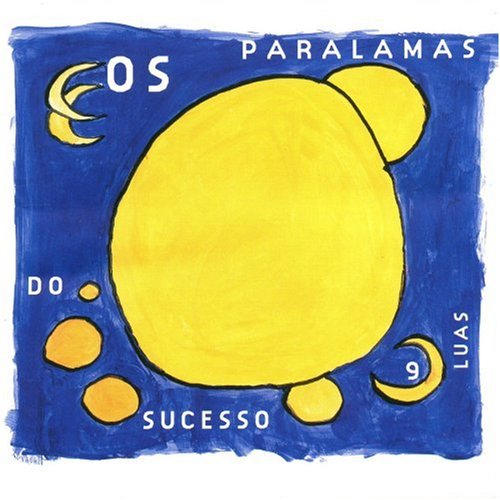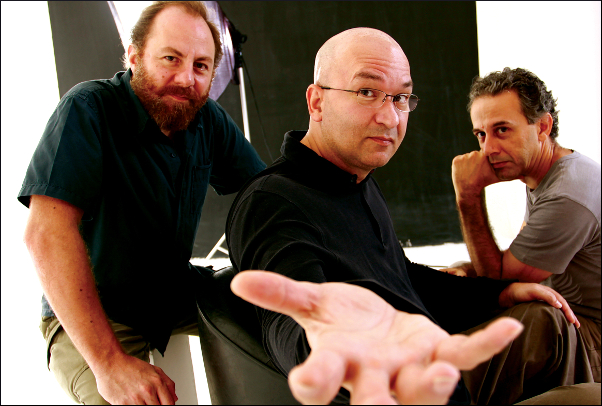
- O Caminho Pisado
- Released in: 1996
Arguably among Paralamas’s best lesser-known songs and a fine display of their skill and originality in conveying deep and poetic messages through lyrics, melody, and rhythm.

Arguably among Paralamas’s best lesser-known songs and a fine display of their skill and originality in conveying deep and poetic messages through lyrics, melody, and rhythm.
Overshadowed by other hits from the 1996 album 9 Luas, the song “O Caminho Pisado” never became one of Paralamas do Sucesso’s blockbusters. Yet, it is arguably among the band’s best lesser-known songs and a fine display of their skill and originality in conveying deep and poetic messages through lyrics, melody, and rhythm. The song’s title can be translated literally as “the trodden way” or, more generally, as “the beaten path.” The “way” or “path” in question concerns the predicament of a poor man, who finds himself in the midst of social problems in a big city, struggling between the reality of an unsatisfying and low-paying job and the illusory promises of redemption at the margins of society.
The first part of the song centers on the man's routine. He wakes up early in the morning and gets ready for work. Despite feeling so tired and sleepy (“o sono persiste”) the sun is punctual and the day must begin (“o sol já não tarda”). This man follows an “old ritual” that he preserves out of necessity and for the advantage of others, not because it benefits him. The “mesmo pão comido aos poucos” (same bread eaten slowly), mentioned in the fifth line, does not imply that he has a lot of time to eat breakfast. Rather, it is an indication of his financial struggle. It is the “same” loaf of bread from previous meals, which he needs to ration because it may be all he will have to eat for a while. He reads the newspaper and everything seems to be the same. Another day has gone by, marked by violence, but he is apathetic: “Tanto faz.” This idiom is very common in Brazilian Portuguese, and it means “It doesn’t matter,” “Whatever,” or, when presented with a choice between various possibilities, “Either way.”

The poor man puts on his “o velho paletó surrado” (old, raddled coat) and takes the beaten path, which begins with the struggle of taking public transportation and trying to find a vacant seat. Note, however, that he does not ride the “ônibus” (bus), “metrô” (subway), or “trem” (train), but rather the “lotação.” Literally, this means “capacity,” as in the maximum capacity of a room. Here, though, it refers to a form of transportation that emerged during the 1990s in some of Brazil’s biggest urban centers. It consisted of vans or small buses operated illegally by unlicensed groups which served people beyond the reach of the official mass transit system. They most commonly brought poor workers, from the outskirts of the city or the favelas (slums), to their workplace in the downtown area. “Lotações” were not regulated or inspected, and most units were in bad shape and transported more people than those allowed by their maximum capacity (hence their name). Eventually, after a few tragic accidents, the government and the private sector teamed up to find a safer solution to the problem of public transportation. Yet the man in the song is riding the “lotação,” and all he can hope for is to find a seat and, perhaps, take a nap and dream. But every day is the same.
The second part of the song opposes this reality to the possibilities afforded by free time during the weekend. Here, Herbert Vianna – the Paralamas’s lead singer, songwriter, and guitar player – gives us another witty play on words: “dias úteis” is the typical Portuguese expression for “weekdays,” but it translates literally as “useful days.” When the week is over, Vianna does not call the weekend “fim de semana” or “final de semana,” but rather “dias inúteis,” that is, “useless days.” For the poor man in the song, the weekend is “useless” and pointless because it cannot sufficiently remind him of who he is nor can it help him completely forget about his problems. The man seeks diversion in the “barra pesada” (the worst parts of town), where a “mão pesada” (an oppressive hand) offers him illicit drugs – “toma uma bola” – and urges him to “começa a viagem” (take a trip). Whether he accepts or not, he is not naïve. The poor man knows that what is being offered to him is just a cheap, empty promise that things will change, when in fact they will remain the same.

Vianna’s poetic portrait of this brutal reality is even more convincing because of his monotone, almost rap-like singing. For the advanced student of Portuguese, this song is a chance to pick out subtleties in pronunciation and accent. Despite growing up mostly in Rio de Janeiro, Vianna does not have the typical carioca accent (in which, for example, the “s” at the end of a word sounds like “sh”). Rather, he sings mostly like someone from São Paulo, except for his pronunciation of the letter “r” before consonants, as in “tarda,” “jornal,” and “normal,” which a typical paulistano would say more like an American English-speaker, as in the English word “normal.” Truly, this is a great song, which provides a unique insight into the hardships faced by many Brazilians, and which shows aspects of reality that are often ignored by mainstream media and entertainment.